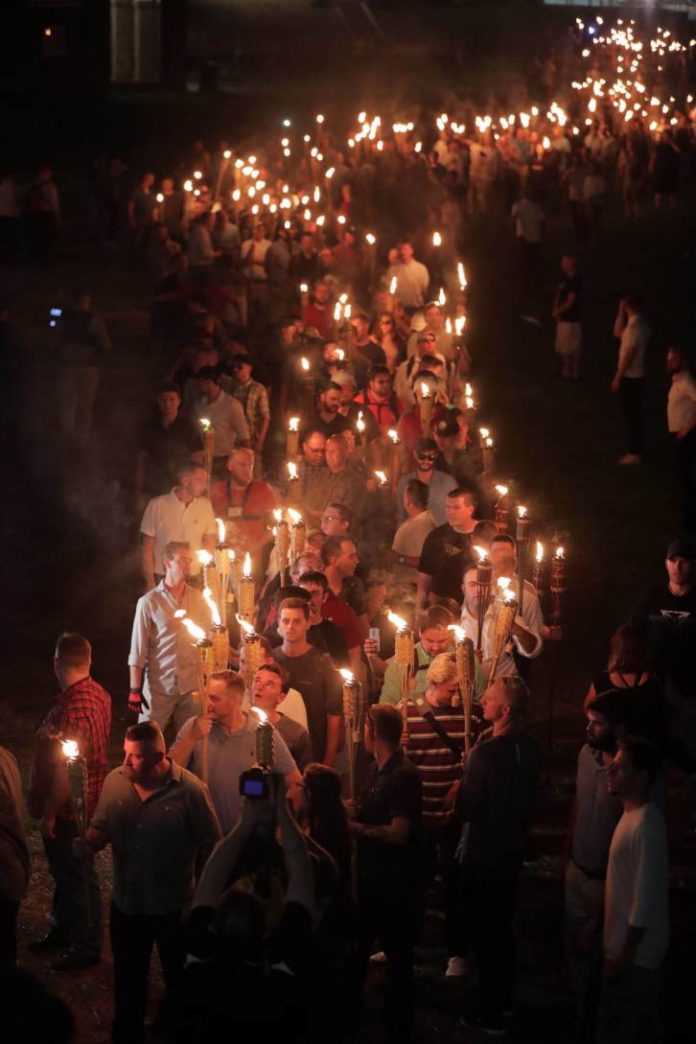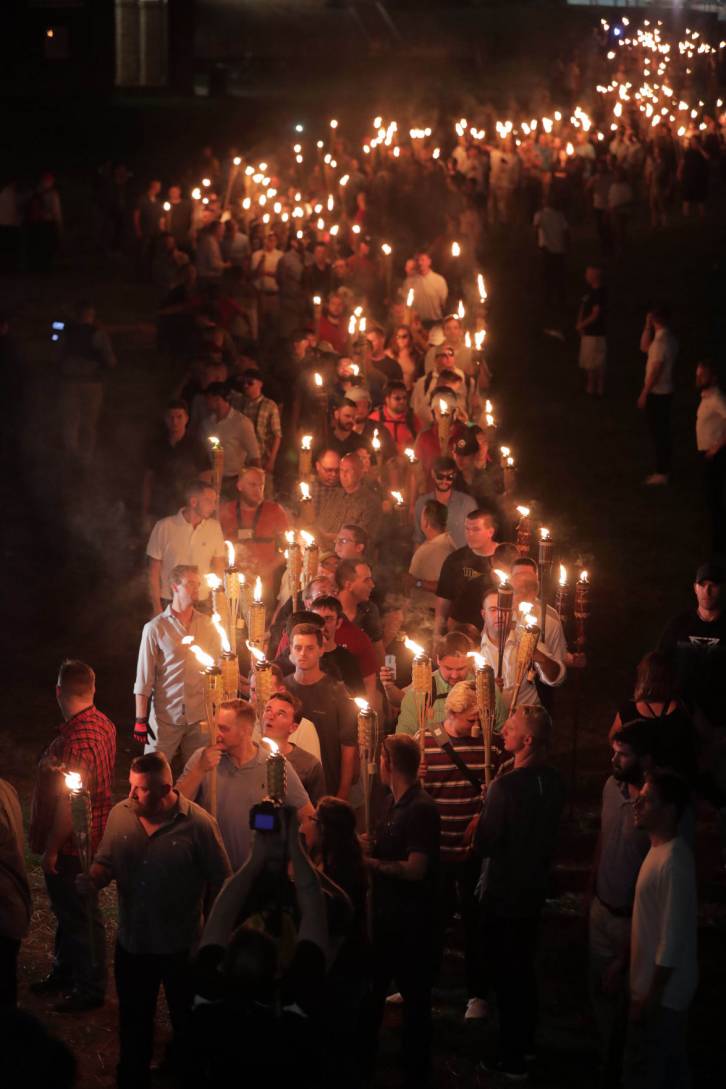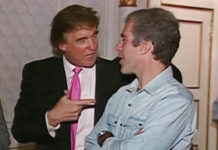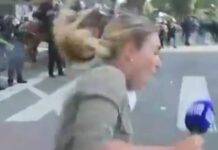This article by Senior Correspondent Trey Garrison was first published at National-Justice.
The fourth day the trial Sines v. Kessler saw the plaintiffs and defendants offer their opening statements to the jury and before U.S. District Court Judge Norman K. Moon.
Overall the consensus was that the pro se defendants, those representing themselves without legal counsel, did better than expected, while only a few of the lawyers for the defense acquitted themselves well. Meanwhile, the plaintiffs’ attorneys threw out a bunch of unconnected allegations and facts and tried to tie them together, to little effect.
How a jury might receive the two sides’ arguments, however, is hard to gauge, especially on the first day of statements.
Plaintiff attorney Karen Dunn of Integrity First for America had a rough start with AV problems, but then made her statements accompanied by a video that included clips of various defendants before, during and after the rally.
Jewish activist attorney for the plaintiffs also made opening statements, and both were heavy on emotional appeals, while sparse on legal arguments. After four years and $20 million in legal funds raised, the argument they made alleging a conspiracy among defendants to go to Charlottesville to purposefully commit racially motivated violence was compared by some observers to Charlie Day of “It’s Always Sunny in Philadelphia” trying to solve the riddle of who Pepe Silva was.
Essentially it came down to because the defendants conspired in planning the legally permitted and upheld “Unite the Right” rally in 2017, and violence ensued, the defendants therefore conspired to commit violence.
At one point, Dunn said the Friday night torch march took a less direct route from the start point to the Thomas Jefferson statue and was evidence of intent to commit violence.
She also said the defendants never expected their planning communications to be seen in public or a court room, but then later argued that they communicated using codes – “front stage and backstage communications” – to hide their intent if it was made public.
The plaintiffs closed playing a post rally rant by a visibly angry and drunken Richard Spencer, one of the 20 defendants, that seemed at first subpar for the defense, but it’s likely the defense will point out exactly that – it was a statement after the fact in the heat of the moment – that isn’t evidence of conspiracy, when that audio is formally entered into the record.
Kaplan at one point also rhetorically asked jurors whether the plaintiffs” violent members of Antifa, or were they community members bravely standing against White nationalists? More than one legal commenter noted that could-be troubling framing, especially since plaintiffs all deny being Antifa and defendants say they have proof otherwise that they will enter into the record.
James Kolenich of Kolenich Law Office, representing James Kessler, Nathan Damigo and Identity Evropa, started off the defense opening statements, saying it is not legally relevant if the defendants or what they say or believe is “reprehensible.” This is common legal rhetoric but many complained it conceded grounded unnecessarily, painting his clients as reprehensible and only worthy the basic rights and entitlements under law.
Kolenich also argued that yes, his clients helped plan a legally permitted political rally and that they planned for the possibility of violence, but they did not plan violence.
Pro se defendant Richard Spencer then made his opening statement, saying this case ultimately is not about the “scattered often stupid ramblings and insults” of the AltRight, Donald Trump, or other distractions.
“Both sides, or I should say all sides because there were more than two,” were pushed into the street, which created chaos, he said. “Many people suffered and were injured.”
Further, he said, this case is about whether he was involved in a malign conspiracy to commit racially motivated violence.
You have to decide whether “to give a bad guy a fair shake, that’s hard. And that is the challenge that you all, that we all, face in this court,” Spencer said.
Plaintiffs will push the idea, he continued, that you are either on the side of the angels or the devil, but that the jury’s duty is the rational application of the law, adding, “Deciding on my behalf says absolutely nothing” about the jury’s attitude toward his beliefs.
“You can go out and bash me on twitter when this is all done,” he said.
Noting that he was an invited guest and not involved with the planning, he said, “My attendance, my intention to speak boldly. It is implied that this led to chaos, that I am somehow liable for injury and suffering by my mere presence.”
“It’s also an attempt to silence more idealistic and articulate speech, not just me at my worst moments, but me at my best moments, when I sincerely talk to the world about what I believe in.”
Christopher Cantwell, also pro se, made what many observers thought was the most compelling and entertaining opening remarks, though some caution what sounds like good political rhetoric isn’t always the best legal argument.
However he related directly to the jury, was witty, and he made memorable arguments and points. He was humorous and self-deprecating, and potentially defused several arguments the plaintiffs will likely make regarding his involvement.
“If the people who want to assault me over my political groups want to call themselves a racial interest group that does not entitle them” to legal recourse, he argued, and then noted that “Right-wing rallies only turn violent when leftists attack” the right wing.
He also called out at least one of the plaintiffs by name.
“People like (plaintiff) Seth (Wispelwey) give ideological cover for violent tactics on the left,” he said, and that the only time plaintiffs mentioned Antifa was to deny any connection to it, which he said he will prove in the course of the trial is a lie.
He also said that the jury would hear the phrase “community defense,” which he said means weapons.
“Community defense is something very different from self-defense,” he said. Rather he said, it is the use of violence against undesirable political outcomes.
“Before we’re done here, you’re going to know I’m not an idiot. I’m going to do my best to make this fun,” and that he would be proud of himself if he could make plaintiffs laugh at things they shouldn’t.
He also charged that “They hired some very well paid people to complicate things,” he said, referring to some plaintiffs. The plaintiffs will show the jury racism and they’ll show them violence and try to imply the relationship is causal, he said, and that is a trick that the jury shouldn’t fall for it.
Cantwell argued that “If I were conspiring to commit a crime, why would I let a reporter (Elle Reeve of Vice at the time) shadow me? Why would I be recording it?,” he asked. Cantwell wore a body cam in public the whole time. “This is the behavior of an activist and a performer, not a criminal.”
Cantwell closed by giving the URL for his website and saying, “I hope when this is all over you become diehard fans and together we can try to save the country.”
NJP Chief of Staff Warren Balogh, on his Telegram channel, had this to say of Cantwell’s opening statement:
“Cantwell did great. He was affable, disarming, funny, fallible, self-deprecating but also made extremely important legal points. And above all, he made them in a common sense way. A jury trial is a show. Kaplan and Co. understand that, which is why they are relying on 1% legal points and 99% emotional/political points,” Balogh wrote. “So far, Cantwell seems to understand that the most and he’s fighting fire with fire. He’s speaking on a common sense level, he’s not throwing his co-defendants under the bus, and he’s being genuine and real and truthful. He ended it with “calling someone a racist is not an excuse to use violence, or to abuse the legal system”—what every non extreme-left White person in the country has been thinking for two years.”
Attorney James Campbell representing James Fields, whose car crash on Aug. 12, 2017 resulted in the death of Antifa activist Heather Heyer, simply stated that he was “not here to defend hate” and there’s no question “my client committed racially motivated violence” but that there’s nothing showing a conspiracy.
“There will be no emails, no messages between Fields and any organizer of Unite the Right,” Campbell said. “In fact, you will not hear any defendant or any witness say that they knew James Fields before August 12, 2017.”
Attorney Bryan Jones for Michael Hill, Michael Tubbs and League of the South is up now said to the jury, “Ask yourselves if the evidence proves my clients had anything to do with Fields’ car wreck. The photo of Kline (Eli Mosley) standing near Fields is their only evidence of a connection to anyone and it proves nothing about my clients.”
Attorney Edward ReBrook IV, representing the National Socialist Movement, gave what was agreed the worst statements of the day, spending as much effort as the plaintiffs in condemning his clients and other defendants.
He even quoted Inglourious Basterds, the Jewish revenge fantasy film about killing National Socialists in World War 2.
The last opening statement was from attorney Josh Smith, representing Matthew Heimbach, Matthew Parrot and the Traditional Workers Party.
He emphasized that the “Unite the Right” rally had a legal permit, and about what went down before and at Charlottesville with the federal judge ruling on the hecklers’ veto, and fact that the police forced both sides together to make them fight.
Smith argued that counter-protesters were the ones that conspired against TWP and others.
Smith recounted in detail all the warnings TWP gave their people against violence, illegal actions, taunts, slurs and so on, and how they refused to take place in the torchlight march simply because they didn’t have a permit, even though one was not necessary.
Smith also made the point that his clients were working with the police to make sure no violence happened.
“Those are not the actions of people conspiring to commit hate crimes,” he said.
After the day, Smith told National-Justice that he was pleased so far.
“Cases aren’t really ever won on opening statements, anyway — because you‘re limited in what you can say – argument isn‘t allowed, and because the jury will forget much of the opening statements throughout the rest of the trial. But you can lose a case on opening statements if you make such a bad impression on the jury that you can’t ever recover from it,” he told National-Justice. “In that regard, I‘d say opening statements were a success.”
The first witness for the plaintiff will take the stand Friday morning.
In summary, the 10 plaintiffs and their attorneys allege that the defendants “conspired to commit racially motivated violence” at the legally permitted Unite the Right rally held in August 2017. The 2017 lawsuit – amended in 2019 – lists 20 White nationalist organizations and individuals.
The lynchpin of the lawsuit is the claim that organizers planned the rally with the purpose of committing violence. The independent Heaphy Report, which plaintiffs have desperately tried to avoid being introduced as evidence in the case, proves this accusation to be a blatant falsehood.
Kaplan is calling her first witness tomorrow. Trial resumes at 9 a.m. ET on Friday. The trial is expected to last four weeks.
This is a civil trial and the jury consists of 12 members with no alternates. Jurors could drop out or be struck for whatever reason, but as long as six remain there can be a verdict.
A finding of liability in this court would require a unanimous verdict.











